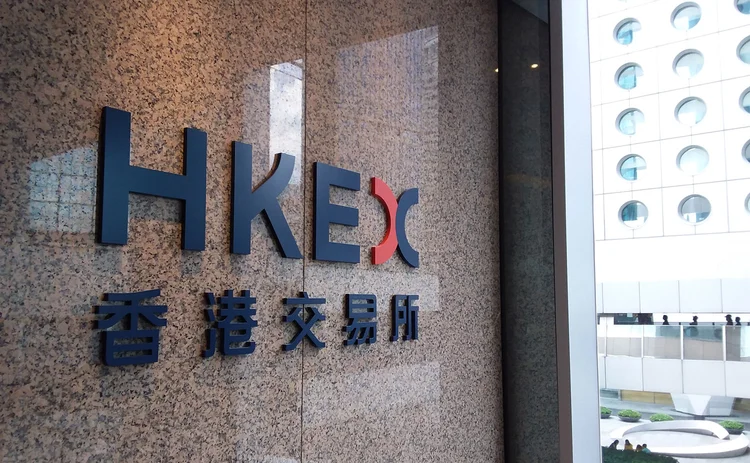
Derivatives exchange house of the year: Hong Kong Exchanges and Clearing
Asia Risk Awards 2020

Hong Kong Exchanges and Clearing (HKEX) saw its highest ever half-year profit this year on the back of rising public listings activity from Chinese firms. But it is the work that the China-facing exchange has done – and continues to do – on its underlying architecture that sees it take home the exchange of the year award this year.
IPO ecosystem
In the first half of this year there were 64 new initial public offerings (IPOs) in Hong Kong, raising a combined total of HK$92.8 billion (US$11.9 billion). This represents an increase of 29% from last year and marks Hong Kong out as the world’s number-two destination for IPOs, after Nasdaq. Last year it managed to beat the US exchange to the top spot – and it is hoping to do so again at the end of this year.
“Since 2000, Hong Kong has gone through many phases in the growth of its IPO market. The latest is that Chinese companies listed abroad are returning to list in Hong Kong,” says Wilfred Yiu, head of markets at the exchange.
He adds that this is why having a full ecosystem, across a broad breadth of products, is so important.
If you fast-forward a few years, with the suite of products we are building up, it is not inconceivable that people will like to use HKEX as their primary trading place and risk management centre
Wilfred Yiu, HKEX
“Listings are a fundamental driver of our business, starting from IPOs to cash trading, as well as market data and many other business lines,” says Yiu. “So every time when we get one of those opportunities, we capture it. People who participate in our market want more investment choices, and new listings will increase the diversity of the market.”
HKEX is particularly proud of its derivatives offerings, which Kevin Rideout, managing director of global client development, says go well beyond simple futures.
“Futures on their own of course have got a life – and this is where other exchanges have done very well – but they’ve got a better life when they can play off against options, exchange-traded funds (ETFs) and structured products,” says Rideout. “HKEX also offers a very robust options market and, furthermore, a very robust market for ETFs and structured products.”
MSCI
One of the biggest coups for HKEX this year has been the switch of a handful of MSCI’s futures contracts from rival Singaporean exchange SGX to the Hong Kong-based exchange. MSCI chose not to renew the licence agreement it had with SGX when it lapsed in February and, in May, HKEX signed an agreement with MSCI for many of these contracts instead.
“MSCI itself has something like 14 trillion dollars of assets benchmarked to it, so it’s obviously very attractive for us, and it plugs neatly into the ecosystem [that we are building],” says Rideout.
HKEX launched its first tranche of 10 MSCI futures contracts on July 6, which are dominated in US dollars and track underlying equities in markets such as Australia, mainland China, India, Indonesia, Japan, Malaysia, Taiwan and Thailand. Since then 33 other MSCI equity futures have been listed on the exchange, with the remaining six futures due for listing on September 28.
“If you fast-forward a few years, with the suite of products we are building up, it is not inconceivable that people will like to use HKEX as their primary trading place and risk management centre,” says Yiu. “The MSCI product suite is a great opportunity for us and is reinforcing the importance of our product ecosystem that we have talked about.”
Blockchain
Another area where HKEX is looking to bring additional value to the market is in distributed ledger technology.
The potential of China’s stock market is vast, and investors from all over the world are clamouring to get a slice of the pie. But this comes with significant challenges. While most markets are cleared and settled within two days of them taking place (so-called T+2), the regulators enforce simultaneous settlement of trades (T+0). This discrepancy means a lot of equity trades have to be pre-funded, since an onshore Chinese broker may have to settle them on behalf of offshore clients before the official settlement instruction has actually been given. This serves as a drag on investments.
Since 2018, HKEX has been working on a blockchain solution to shorten the offshore settlement cycle, and this year offered the solution to a select few clients on a pilot basis. The plan is to expand the blockchain settlement solution to other market participants later this year.
“We have been trying to innovate across the whole settlement chain,” says Rideout. “We thought, ‘why is it T+2 everywhere in the world’? Why can’t it be T plus just a few minutes? Effectively, as soon as the trade is done the handshake can happen and the cash comes in.”
Rideout says that the exchange has seen “great support” for this initiative. If the solution is successful, Rideout says it could be something other exchanges are interested in, too.
“I think everyone is grappling for a blockchain solution. The vision we have of our blockchain solution is to see if it could also change the settlement cycles for other exchanges,” says Rideout.
Only users who have a paid subscription or are part of a corporate subscription are able to print or copy content.
To access these options, along with all other subscription benefits, please contact info@risk.net or view our subscription options here: http://subscriptions.risk.net/subscribe
You are currently unable to print this content. Please contact info@risk.net to find out more.
You are currently unable to copy this content. Please contact info@risk.net to find out more.
Copyright Infopro Digital Limited. All rights reserved.
As outlined in our terms and conditions, https://www.infopro-digital.com/terms-and-conditions/subscriptions/ (point 2.4), printing is limited to a single copy.
If you would like to purchase additional rights please email info@risk.net
Copyright Infopro Digital Limited. All rights reserved.
You may share this content using our article tools. As outlined in our terms and conditions, https://www.infopro-digital.com/terms-and-conditions/subscriptions/ (clause 2.4), an Authorised User may only make one copy of the materials for their own personal use. You must also comply with the restrictions in clause 2.5.
If you would like to purchase additional rights please email info@risk.net
More on Awards
Best user interface innovation: J.P. Morgan
J.P. Morgan wins Best user interface innovation thanks to its Beta One portfolio solution
Market liquidity risk product of the year: Bloomberg
Bringing clarity and defensibility to liquidity risk in a fragmented fixed income market
FRTB (SA) product of the year: Bloomberg
A globally consistent and reliable regulatory standardised approach for FRTB
Best use of cloud: ActiveViam
Redefining high-performance risk analytics in the cloud
Best use of machine learning/AI: ActiveViam
Bringing machine intelligence to real-time risk analytics
Collateral management and optimisation product of the year: CloudMargin
Delivering the modern blueprint for enterprise collateral resilience
Flow market-maker of the year: Citadel Securities
Risk Awards 2026: No financing; no long-dated swaps? “No distractions,” says Esposito
Pricing and analytics: fixed income – Quantifi
Quantifi delivers high-performance, transparent and adaptable pricing and risk analytics for fixed income and credit markets







